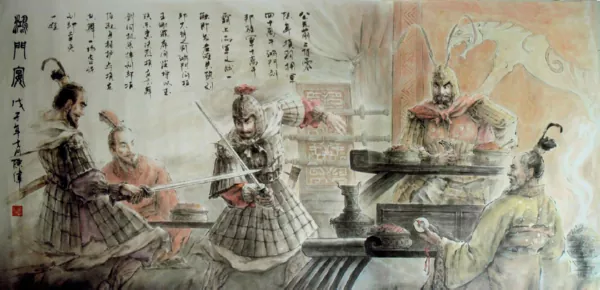A 2,000-Year-Old Story That Explains Modern China
When Chinese historian Zhang Hongjie published his essay "The Victory of Liu Bang Marks the First Spiritual Degradation of the Chinese," he touched a nerve in contemporary society. To foreigners, China may appear as a land of dazzling skyscrapers and economic miracles, but beneath this surface lies a cultural DNA shaped by a 2,200-year-old historical turning point: the triumph of a street-smart rogue (Liu Bang) over a principled nobleman (Xiang Yu).
This is not just ancient history. In China today, parents bribe teachers for their children’s school placements, counterfeit goods flood e-commerce platforms, and factories cut corners to meet production targets—all modern echoes of Liu Bang’s infamous line: "If you’re going to boil my father, save me a bowl of the soup." To understand why such behavior persists, we must revisit the Han Dynasty’s founding myth.

Part 1: The Cultural Code Hidden in the Chu-Han Contention
1. Xiang Yu: The Last Nobleman
Xiang Yu, descendant of a Chu general, embodied pre-Qin aristocratic values:
- Refused to ambush Liu Bang at the Hongmen Feast ("A nobleman doesn’t attack by stealth")
- Returned Liu Bang’s captured family unharmed ("War shouldn’t target civilians")
- Chose suicide over surrender at the Wu River ("Death with honor beats living in shame")
2. Liu Bang: The Blueprint for Chinese Pragmatism
The Han Dynasty’s founder operated by different rules:
- Abandoned his children during a chariot chase to escape faster
- Mocked scholars by urinating in their ceremonial hats
- Told Xiang Yu: "Cook my father? Don’t forget to share the soup!"
Zhang Hongjie argues that Liu Bang’s victory institutionalized three cultural traits:
- Survival First: Ethics bend to practical needs (e.g., fake vaccine scandals)
- Rule-Breaking as Virtue: "If others cheat, I must cheat better" (see counterfeit iPhones)
- Face Over Substance: Appearing successful matters more than how you succeed (e.g., "influencer culture")
Part 2: Why "Bad Money Drives Out Good" in Chinese Society
1. Historical Roots: The Qin System’s Legacy
The Qin Dynasty (221–206 BCE) established China’s governance template:
- Shang Yang’s Reforms: Rewarded peasants for enemy heads in war, reducing morality to transactional gains
- County System: Replaced aristocrats with appointed officials loyal only to the emperor
- Legalist Philosophy: "A ruler needs neither virtue nor trust—only power" (Han Feizi)
This created a society where:
- Short-Term Gains Trump Long-Term Trust: Farmers using toxic pesticides know it’s wrong but say: "If I don’t, others will"
- Institutionalized Hypocrisy: School principals preach integrity while accepting bribes for admissions
2. Modern Case Studies
| Ancient Pattern | Modern Manifestation |
|---|---|
| Liu Bang’s "Survival at Any Cost" | Food vendors using gutter oil to undercut competitors |
| Xiang Yu’s "Honorable Defeat" | Honest officials marginalized for refusing bribes |
| Qin’s "Merit Through Brutality" | Factories exploiting workers to meet export quotas |
A Beijing street vendor’s confession captures this mindset: "I mix chalk powder into flour because everyone does it. Clean flour? You’ll starve!"
Part 3: What Foreigners Often Miss About China
1. Not "Good vs Evil," But a 2,000-Year-Old System
Western media often reduces China to "authoritarianism vs democracy," but the deeper conflict is between:
- Qin-Han Pragmatism: Prioritizing stability and growth (e.g., lifting 800 million out of poverty)
- Confucian Idealism: The unfulfilled dream of rule by virtue (e.g., anti-corruption campaigns)
2. Why Nobility Failed in China
Unlike Europe’s feudal contracts or Japan’s bushido, China’s geography demanded centralized rule to manage floods and invasions. The price? Sacrificing aristocratic checks on power. As historian Yu Ying-shih noted: "China traded knights-errant for water conservancy officials."
3. The Resilience of "Rogue Wisdom"
Modern Chinese admire Xiang Yu’s nobility in theaters (see film "Farewell My Concubine") but emulate Liu Bang in life. A Weibo poll shows:
- 78% agree "Xiang Yu was heroic but foolish"
- 62% admit "I’d act like Liu Bang if desperate"
Part 4: Rebuilding "Nobility" in a Liu Bang World
1. Lessons from Chinese History
- Tang Dynasty’s Poetry Cult: Literati used art to counter vulgar pragmatism
- Ming Dynasty’s Jianghu: Outlaw heroes in novels kept noble ideals alive
- 1980s’ "Culture Fever": Intellectuals sought answers in pre-Qin philosophy
2. What China Needs Now
- From "Face" to "Faith": Like Hangzhou’s credit-score system rewarding honest businesses
- Teaching Xiang Yu in Schools: Not as a loser, but as proof ethics matter beyond winning
- Globalizing Chinese Wisdom: Jack Ma’s early motto "Customers first, employees second, shareholders third" echoes Confucian priorities
3. What Foreigners Can Understand
China’s "bad money" problem isn’t moral failure—it’s the cost of maintaining a civilization that survived invasions, famines, and revolutions. As Zhang Hongjie concludes: "Our ancestors chose survival over nobility. Now we must choose both."
Epilogue: The Dumpling Seller’s Choice
In a Chengdu alley, a vendor posts: "No MSG, no reused oil—tastes worse, costs more." Surprisingly, his stall thrives. When asked why, he smiles: "Liu Bang won, but we still name our sons ‘Xiang Yu’."
Perhaps this is China’s real story: a people who’ve mastered the art of survival now seek something worth surviving for. To foreigners confused by China’s contradictions, remember: this is a civilization trying to heal a 2,200-year-old wound. The bandage may look messy, but the patient is still breathing.
If you want to understand China, you must first understand her deeply.








